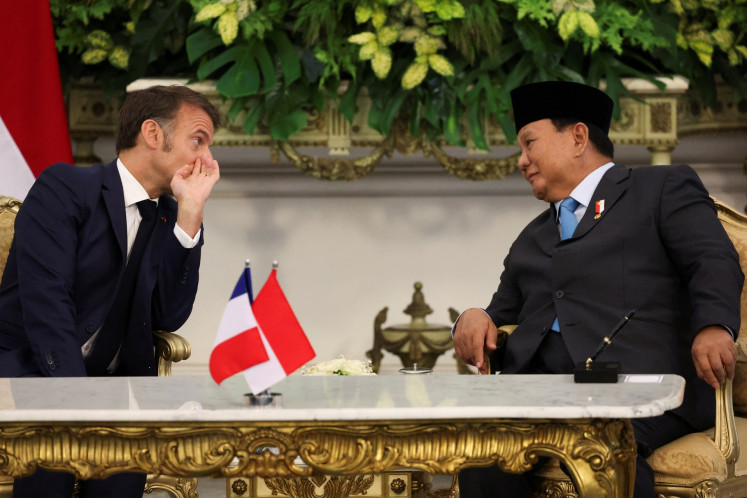Meet unlikeliest internet superstar: Didi Kempot
Personal touch: Singer Didi Kempot, known as the Godfather of the Broken Heart, greets his fans while performing at the People’s Entertainment Show in Wuled village, Pekalongan, Central Java, on Tuesday evening
Change text size
Gift Premium Articles
to Anyone

P
ersonal touch: Singer Didi Kempot, known as the Godfather of the Broken Heart, greets his fans while performing at the People’s Entertainment Show in Wuled village, Pekalongan, Central Java, on Tuesday evening.(JP/Suherdjoko)
Until very recently, singer Didi Kempot was known only to a community of fans who were mostly working class Javanese fond of his maudlin version of campur sari music (a blend of traditional Javanese folk songs and synth-based modern composition), Kempot is a shortened version of the Indonesian kelompok penyanyi trottoar, meaning street singer.
His brand of sad love songs struck a chord with millions of Javanese-speaking fans including thousands in Suriname, where he already enjoyed superstar status.
In recent months, however, Didi’s music has managed to capture the hearts and minds of urban and middle class youths who have been drawn to his cheesy lyrics and lovelorn vocals to soundtrack their own ill-fated love story. This new legion of fans identifies themselves as “sad boys” and “sad girls” and have blown up the internet by posting comments and stories about the appeal of Didi’s music.
Many established media outlets have written think pieces to make sense of the newfound appeal of Didi, born Didi Mulyadi in Surakarta, Central Java, on Dec. 31, 1966, while social media personalities have competed among themselves to show their devotion to him. Some have gone as far as calling him Lord Didi.
CEO of alternative media
Mojok.co Agus Mulyadi posted a Twitter thread on why Lord Didi deserves more attention from music fans.
The thread, which quoted another tweet about Didi’s recent concert in Balekambang Park, Surakarta, which was attended by a young crowd singing their broken hearts out, quickly caught netizens’ attention, garnering more than 7,000 retweets and over 5,000 likes.
Didi himself has jumped into the Twitter pool with his official account @didikempotid, which since June has raked in more than 65,500 followers.
On YouTube, a video of Didi’s concert, which was attended by fans of various ages and captured by popular YouTuber Gofar Hilman, trended for several days.
On July 23, Didi headlined a concert in Cikini, Central Jakarta, which was held as part of the National Awakening Party’s 21st anniversary celebration. Instead of a religious or political atmosphere, the event boasted a lively ambience enlivened by a crowd of old and new fans who wanted to know what the fuss was about.
Runi Ayu, 24, a resident of Kedoya in West Jakarta, attended the concert as a “sad girl”, saying it was an experience like no other.
“I was so happy to be among the crowd of Didi lovers, sweating together, singing songs about heartbreak,” she told The Jakarta Post on Monday.
Runi said she sang her heart out during Didi’s hit “Banyu Langit” (Water from the Sky) while reminiscing about her
ex-boyfriend.
“The lyrics ‘nganti kapan tak enteni sak tekane’ [I will wait forever for you to come back] remind me of my ex, for whom I have faithfully waited, although he’s not waiting for me,” she said with a melancholic laugh.
“I saw that these people [the audience] are sad inside, but singing and dancing together heals all of our pain!”
Runi, who was born and raised in Bandung, West Java, said she became familiar with Didi’s songs during her university years in Central Java four years ago.
“His music was often played at the angkringan [food carts unique to Yogyakarta and Surakarta] where I used to hang out. I became familiar with the music but I can’t say that I’m a die-hard fan.”
Another member of the crowd that night, 26-year-old graphic designer Hikmah Prahara, saw a different side to the phenomenon of Didi’s popularity among the younger generation.
“I love listening to his songs because they remind me of my hometown in East Java. Didi’s music is the cure to my homesickness and makes me proud to be Javanese,” he said on Monday.
He added that he enjoyed the increased popularity of Didi as he could have more campur sari karaoke sessions with fellow Javanese migrants in the capital city.
“I feel proud, but I am also annoyed by new fans who snobbishly feel as if they know more about Didi Kempot,” he said, laughing.
Music researcher Irfan R. Darajat from Laras Studies of Music in Society told the Post that to understand the phenomenon, we need to investigate the history of sad songs in Indonesia.
“There was a time when heartbreak songs were not seen as [trendy], and indie music, with its exclusivity, tried to avoid cheesy heartbreak songs,” Irfan said.
He added that there had been a recent effort to raise up music that was once considered “uncool”.
“It’s very hipster; we can say it’s ‘hipster-washing’ even. Some indie music festivals have started to invite dangdut and kasidah [Islamic pop] music groups. Via Valen [a dangdut diva] can sing on Net TV, for example.”
Irfan said Didi offered a rooted, site-specific exclusivity through his heartbreak songs in Javanese, which fits perfectly with the hipster-washing pattern.
“People have a tendency to want to be different from others, for example by turning what is disliked by the majority into something popular,” he said.
Irfan insisted that Didi’s stellar rise to mainstream fame should not detract from the maestro or present him as something “weird, cult-like, kitsch or whatever, and make Didi’s music seem like something exotic. That’s what worries me”, he said.
“Didi Kempot is cool, and he has been cool since the very beginning,” he said.









